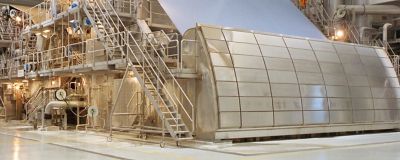Select region & language
- Europe
- Americas
- Middle East & Africa
- Asia & Oceania
Global
Austria
Bulgaria
Croatia
Czech Republic
Denmark
Estonia
Finland
France
Germany
Greece
Hungary
Ireland
Italy
Latvia
Lithuania
Luxembourg
Netherlands
Norway
Poland
Portugal
Romania
Serbia
Slovakia
Slovenia
Spain
Sweden
Turkiye
United Kingdom
Global
Argentina
Aruba
Bolivia
Brazil
Chile
Colombia
Costa Rica
Dominican Republic
Ecuador
El Salvador
Guatemala
Honduras
Mexico
Panama
Paraguay
Peru
Puerto Rico
United States of America
Uruguay
Global
Bahrain
Israel
Jordan
Kuwait
Lebanon
Oman
Pakistan
Palestine
Qatar
Saudi Arabia
South Africa
United Arab Emirates
Global
Australia
Bangladesh
India
Indonesia
Japan
Kazakhstan
Malaysia
New Zealand
Philippines
Singapore
South Korea
Sri Lanka
Taiwan (Chinese Taipei)
Thailand
Vietnam

ABB high-speed moisture sensor
Did you know…
… ABB has the fastest paper machine moisture sensor in the world?
The largest paper or board making machines in the world are longer than 350 meters and around 10 meters wide. Within these massive industrial machines is a continuous production line creating a stream of paper web out of a mixture of cellulose fibers (1%) and water (99%) at speeds exceeding 1,500 meters per minute.
Today’s paper making process follows the principles of the first moving woven wet mat of fiber stem from the late 18th century. As part of this complex process, the wet mat of fiber is dried in the machine to produce a strong, dry paper web. This drying stage of paper production is energy intensive and therefore continuous accurate measurement of the moisture level is critical.
Reducing the water content before the dryer section in the process lowers the amount of energy required for drying – so much that a 1% change in moisture can mean up to $400,000 in energy savings per year. This is where high-speed moisture sensors from ABB are being used to help papermakers optimize energy consumption and raw material usage, without any quality losses.
The fastest and most accurate moisture sensor currently available, ABB’s High-Performance Infrared Reflection (HPIR-R) moisture sensor takes 5,000 measurements per second. For comparison, 50 years ago some 60 measurements per second was accepted as an industry standard. But with today’s speed of the paper web being created, around 17 meters of paper passes the moisture sensor every second! The HPIR-R captures 83 times more data points than 50 years ago. With this amount of data, paper producers know the precise moisture levels of the paper web at all times.
But there’s more: because operators want to know the moisture content not only at one position of the paper web but actually across the entire web, the sensor is built into a scanning frame which moves the sensor from one edge of the paper web to the other. With this the ABB solution can create a high-resolution digital profile of the produced paper. Operators can then use this model to view moisture levels and take actions to ensure it is even across the sheet.
Key facts:
- 5,000 measurements taken per second
- 1% difference in moisture can bring up to $400,000 in energy savings
- Precise, continuous measurement with digital profile creation
Discover more about ABB’s High-Performance Infrared Reflection (HPIR-R) moisture sensor: